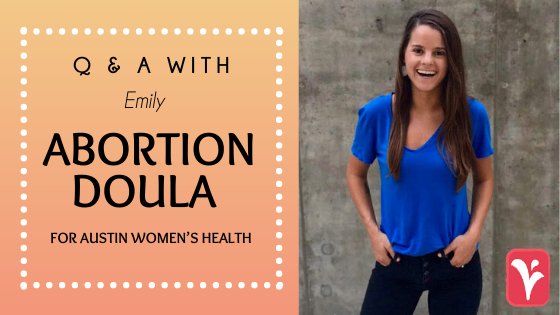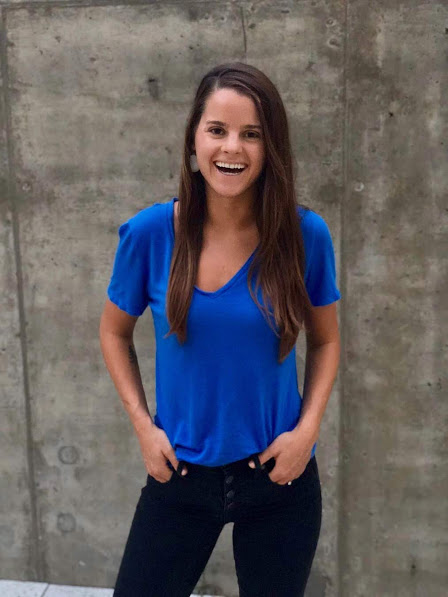Did you get to read last month’s post on the blog – Abortion Doula 101? In that post, we shared information about what a full-spectrum doula is. AWHC’s doula, Emily, is a full-spectrum doula and therefore has received training to support someone in birth, miscarriage, adoption, and abortion.
As a part of our unique approach to abortion care, Austin Women’s Health Center provides free doula support to people during their abortion care appointment with us in our Austin, Texas clinic. We are dedicated to providing each client with comprehensive and individualized medical care. We believe our unique approach offers patients the best medical care available and places us among the best abortion providers in the country. Without further ado, Meet Emily, a full-spectrum doula and social worker providing support to AWHC clients.
Q&A with Emily – Abortion Doula in Austin, Texas
AWHC: What drew you to becoming a full-spectrum doula?
Emily: I think it’s really important that we conceptualize both abortion and birth as normal parts of a person’s reproductive life. As a doula, it would seem insufficient for me to only support people giving birth, understanding that for many, birth is just a part of a larger experience. If I’m going to say that I support people during pregnancy, I think that has to mean regardless of the outcome of their pregnancy.
I, myself, have had an abortion and have given birth. When having my abortion, I was alone. While ultimately I felt great relief to be able to have the abortion, it was nonetheless super emotional, and doing it alone felt isolating. That’s a stark contrast to my birth experience, where I was surrounded by loved ones and a doula. I don’t think it’s right that these experiences were so completely different.
When we treat abortion and birth as two entirely separate entities, I think we’re ignoring the reality that they are not; as we know, the majority of people seeking abortion care already have children. When we silo these experiences, it can be politically dangerous, stigmatizing, and isolating.
AWHC: Why is it important to extend doula support to people who are having abortions?
Emily: Providing abortion doula support is important to me for a few reasons. Without getting too lengthy, I’ll touch on a few of those:
-
There is a serious lack of abortion doula care available. In Austin, you can choose from hundreds of different birth doulas, but you’ll be hard-pressed to find more than a handful of abortion doulas (if that).
-
Patients seeking abortion are most often not allowed to bring a partner or other support person in the room with them during their abortion or in recovery. Understanding that for many folks, having an abortion can be deeply emotional, I think it’s important to provide people with emotional support during and immediately following the procedure so that they feel less alone.
-
Because of the abundance of misinformation circulating about abortion both on the internet and in daily conversations, a lot of people mistakenly believe that having an abortion is an incredibly painful and dangerous procedure. Despite the reality that abortion is very safe, many folks are afraid of the procedure itself and find comfort in an informed and caring confidante who can chat with them in the waiting room, hold their hand during the procedure, and give them a hug in the recovery room.
-
Because of the stigma around abortion, some people don’t have a support person to accompany them to the clinic or to process the experience with them afterward. Abortion doulas can help fill that void.
-
Abortion is a part of normal reproductive life and the experience deserves love and support just as birth does.
AWHC: What approach do you take when supporting someone through abortion, or while waiting in the lobby?
Emily: As a full-spectrum doula, my job is to provide the pregnant person with physical, emotional, and informational support. This might mean taking deep breaths with someone during their procedure, offering a listening ear and validation about the myriad feelings they might be experiencing, or providing them with evidence-based, accurate information about the procedure. As a social worker, I’m trained to follow the lead of my clients; so I try to gauge where people are and what they need and let them essentially guide my manner of giving support.
AWHC: Do you have any advice for someone who wants to be an abortion doula?
Emily: If you can get formally trained, that’s obviously best. If not, read everything you can about full-spectrum doula care and about abortion itself. Having worked for various reproductive rights organizations prior to becoming a doula, I’ve been able to approach the work with what I feel like is a pretty solid understanding of the complexity of abortion experiences, and I think that’s important. So, read, talk to folks who have had abortions (try to hear from people with a range of experiences), and connect with other doulas who provide abortion care.
We appreciate Emily and others like her who are providing support during a time that can feel vulnerable. Those who are making the decision to have an abortion deserve a comfortable space, and at Austin Women’s Health Center, we want that for you!
We welcome your experiences if you’re comfortable sharing them! Did you feel supported during your abortion? Did you have a doula, or did you know they supported all pregnancy options? Is there anything you wanted to know that wasn’t answered here? Let us know in the comments below.
If you have other questions, please fill out the contact form below and we will get back to you as soon as we can.
Contact Form

